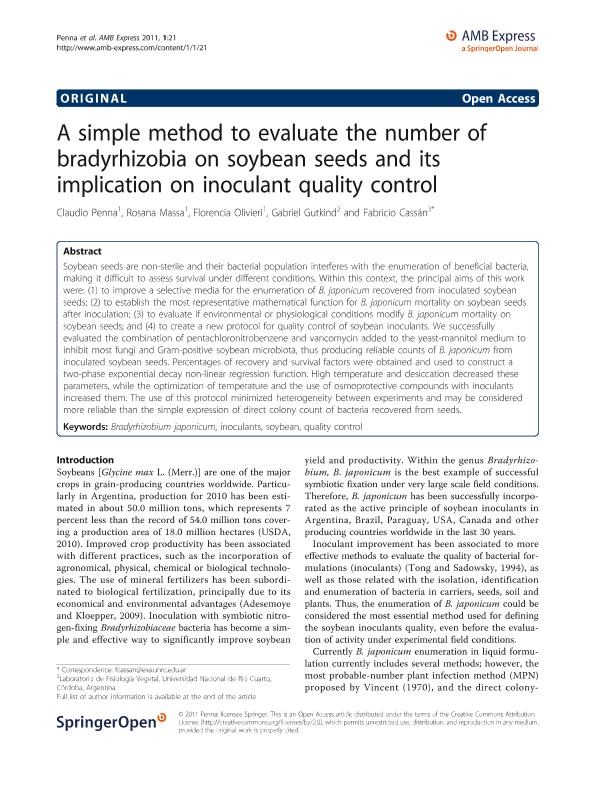Mostrar el registro sencillo del ítem
dc.contributor.author
Penna, Claudio
dc.contributor.author
Massa, Rosana

dc.contributor.author
Olivieri, Florencia Pia

dc.contributor.author
Gutkind, Gabriel Osvaldo

dc.contributor.author
Cassan, Fabricio Dario

dc.date.available
2023-03-28T17:01:42Z
dc.date.issued
2011-07-19
dc.identifier.citation
Penna, Claudio; Massa, Rosana; Olivieri, Florencia Pia; Gutkind, Gabriel Osvaldo; Cassan, Fabricio Dario; A simple method to evaluate the number of bradyrhizobia on soybean seeds and its implication on inoculant quality control; Springer; AMB Express; 1; 21; 19-7-2011; 1-10
dc.identifier.issn
2191-0855
dc.identifier.uri
http://hdl.handle.net/11336/191874
dc.description.abstract
Soybean seeds are non-sterile and their bacterial population interferes with the enumeration of beneficial bacteria, making it difficult to assess survival under different conditions. Within this context, the principal aims of this work were: (1) to improve a selective media for the enumeration of B. japonicum recovered from inoculated soybean seeds; (2) to establish the most representative mathematical function for B. japonicum mortality on soybean seeds after inoculation; (3) to evaluate if environmental or physiological conditions modify B. japonicum mortality on soybean seeds; and (4) to create a new protocol for quality control of soybean inoculants. We successfully evaluated the combination of pentachloronitrobenzene and vancomycin added to the yeast-mannitol medium to inhibit most fungi and Gram-positive soybean microbiota, thus producing reliable counts of B. japonicum from inoculated soybean seeds. Percentages of recovery and survival factors were obtained and used to construct a two-phase exponential decay non-linear regression function. High temperature and desiccation decreased these parameters, while the optimization of temperature and the use of osmoprotective compounds with inoculants increased them. The use of this protocol minimized heterogeneity between experiments and may be considered more reliable than the simple expression of direct colony count of bacteria recovered from seeds.
dc.format
application/pdf
dc.language.iso
eng
dc.publisher
Springer

dc.rights
info:eu-repo/semantics/openAccess
dc.rights.uri
https://creativecommons.org/licenses/by/2.5/ar/
dc.subject
BRADYRHIZOBIUM JAPONICUM
dc.subject
INOCULANTS
dc.subject
QUALITY CONTROL
dc.subject
SOYBEAN
dc.subject.classification
Biología Celular, Microbiología

dc.subject.classification
Ciencias Biológicas

dc.subject.classification
CIENCIAS NATURALES Y EXACTAS

dc.title
A simple method to evaluate the number of bradyrhizobia on soybean seeds and its implication on inoculant quality control
dc.type
info:eu-repo/semantics/article
dc.type
info:ar-repo/semantics/artículo
dc.type
info:eu-repo/semantics/publishedVersion
dc.date.updated
2023-03-28T15:16:21Z
dc.journal.volume
1
dc.journal.number
21
dc.journal.pagination
1-10
dc.journal.pais
Estados Unidos

dc.journal.ciudad
New York
dc.description.fil
Fil: Penna, Claudio. Merck Crop Bioscience Argentina. Laboratorio de Investigación y Desarrollo Básico; Argentina
dc.description.fil
Fil: Massa, Rosana. Merck Crop Bioscience Argentina. Laboratorio de Investigación y Desarrollo Básico; Argentina
dc.description.fil
Fil: Olivieri, Florencia Pia. Merck Crop Bioscience Argentina. Laboratorio de Investigación y Desarrollo Básico; Argentina
dc.description.fil
Fil: Gutkind, Gabriel Osvaldo. Universidad de Buenos Aires. Facultad de Farmacia y Bioquímica. Departamento de Microbiología, Inmunología y Biotecnología. Cátedra de Microbiología; Argentina. Consejo Nacional de Investigaciones Científicas y Técnicas; Argentina
dc.description.fil
Fil: Cassan, Fabricio Dario. Universidad Nacional de Río Cuarto. Facultad de Ciencias Exactas Fisicoquímicas y Naturales. Instituto de Investigaciones Agrobiotecnológicas. - Consejo Nacional de Investigaciones Científicas y Técnicas. Centro Científico Tecnológico Conicet - Córdoba. Instituto de Investigaciones Agrobiotecnológicas; Argentina
dc.journal.title
AMB Express
dc.relation.alternativeid
info:eu-repo/semantics/altIdentifier/doi/https://doi.org/10.1186%2F2191-0855-1-21
dc.relation.alternativeid
info:eu-repo/semantics/altIdentifier/url/https://amb-express.springeropen.com/articles/10.1186/2191-0855-1-21
Archivos asociados
